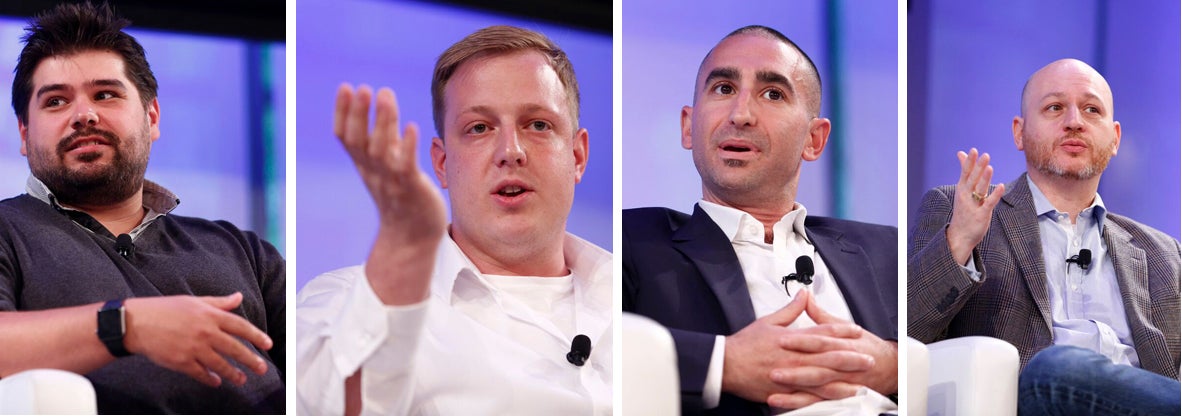
The dander was up at AdExchanger’s Clean Ads IO in New York on Tuesday as the CEOs of two ad blockers engaged in a contentious debate with two prominent adversaries about the rock-and-hard-place situation publishers presently find themselves in.
“It might be ironic that an ad blocker can really play a very important role in creating a more sustainable approach,” said Til Faida, CEO of Adblock Plus creator Eyeo. “We help publishers show alternative, less intrusive ads to people who opt out of traditional online ads to create a new ecosystem in which there are fewer but better ads.”
Of course, one man’s sustainable approach is another man’s shakedown.
Paying Eyeo to show their ads is far from a publisher’s ideal scenario, said Ben Barokas, CEO of Sourcepoint, which sells technology to help publishers unblock ads and engage consumers in a discussion about how, not if, they want to pay, whether that be through looking at ads or subscribing.
“I think it’s blackmail,” Barokas said. “Speak to any publisher in this room and they would agree they are not willing to pay or would only pay under duress.”
Google, for one, is known to pay millions of dollars a year to be on Eyeo’s whitelist. Scott Spencer, director of product management for Google’s sustainable advertising unit, got pretty touchy when he was asked if Google “underwrites” the Acceptable Ads program.
“We don’t underwrite anything,” Spencer said tersely. “Our search ads are acceptable according to the standard, and Eyeo’s business model requires payments.”
Spencer added, “The content needs to be paid for. … If everyone is using an ad blocker, we have a problem.”
By the end of the year, Eyeo plans to hand the Acceptable Ads program over to an independent review board to decide which ads are deemed worthy of passing through the filter. A big criticism of the program in the past was its lack of transparency.
Adblock Plus is also in the midst of launching a service called Flattr Plus that will allow users to make automatic micropayments in exchange for the content they consume.
Some of that money goes to Crystal, an iOS 9 content-blocking app that receives a monthly payment from Eyeo to allow acceptable ads to appear on mobile sites visited by its users.
There’s a logic behind it, said Crystal creator Dean Murphy, who ran a survey of his users in September to figure out why they installed an ad blocker in the first place. Sixty-four percent cited visual clutter and slow load times.
But the majority of users – 71% – said they didn’t mind seeing all ads, just the “worst ads,” and that they would whitelist sites that optimize for performance.
“Acceptable Ads seems to be one of the only initiatives at the moment for users actively blocking ads,” Murphy said. “[It’s] ad blockers helping publishers monetize while giving users what they want, which is a better experience.”
Indeed, everyone seems to agree on that point. A small cohort of people never want to see ads ever under any circumstances, but most people are just seeking a better experience.
They want an experience that isn’t “so horrifying, so upsetting and so distressing to the average human being that, given half a chance and given the availability of the software,” they opt to block, said Randall Rothenberg, CEO of Interactive Advertising Bureau.
But something’s gotta give.
“I don’t think that having a frustrating ad experience makes sense, but I also don’t think everyone should have to pay to have their ads seen when they are OK,” Spencer said.
Which leads to the question: What is Google going to do about it? Google is certainly hatching some sort of plan – perhaps an Acceptable Ads-like program of its own – but details haven’t been released.
What is clear, though, is that “really annoying ad experiences should not exist,” Spencer said. “The question is, what do you do with good acting publishers and advertisers? That’s where the challenge lies.”
Here’s the full video:












